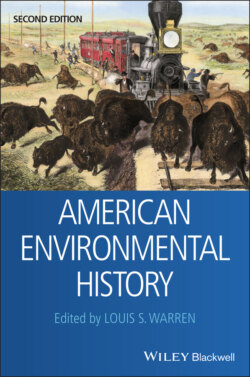Читать книгу American Environmental History - Группа авторов - Страница 62
Lion Gardener, “Livestock and War in Colonial New England”
Оглавление(Excerpt from “Leift Lion Gardener: this Relation of the Pequot Warres,” Massachusetts Historical Society Collections, 3rd ser. 3 (1833), 154–5.)
The second document in this section illuminates some of the surprising ways that Indians responded to environmental changes in the New England landscape. Lion Gardener was a New England colonist who took part in the Pequot War, during which most of the Pequot Indians of the region were massacred by a colonial militia. Gardener’s account is of course full of his own biases, and his relating of the Indians’ perspective on these events is questionable since he relied on hearsay for much of it. Nonetheless, this excerpt from his history of the Pequot War is instructive for its environmental context. Here, he recounts what he was told about the reasons for Indian hostility to settlers. Among the Indians battling the settlers were the Naragansetts. A Naragansett leader, Miantanomo, has journeyed to a neighboring village and invited its inhabitants to join a war against the settlers. Whether Miantonomo ever made such an appeal is unknown. Naragansetts under his leadership sided with the English during the war against the Pequots. But Miantonomo was killed some years later after reportedly attempting to lead an Indian alliance against the English. In this document, you will have to make allowance for Gardener’s spelling: “Naraganset” for Naragansett, and “Miantenomie” for Miantanomo. Note how, in this account, Indians recognized the changes in the land around them and had a good understanding of the reasons for those changes. Although we tend to think of environmental change as non-violent, how are war and biotic shift entangled in the story of colonialism? Was Miantonomo interested only in expelling settlers and returning to old ways? Or was he hoping to innovate, combining new alliances with older Indian traditions and the new “technology” of livestock? Indians often saw the advantages of owning livestock, and many would have owned more themselves except for the continual encroachment on their lands by expanding and aggressive colonial settlements.
What possibility was there for Indian success in the new market economy without secure title to large grazing and farming parcels?
* * *
A while after this came Miantenomie from Block-Island to Mantacut with a troop of men, Waiandance being not at home; and instead of receiving presents, which they used to do in their progress, he gave them gifts, calling them brethren and friends, for so are we all Indians as the English are, and say brother to one another; so must we be one as they are, otherwise we shall be all gone shortly, for you know our fathers had plenty of deer and skins, our plains were full of deer, as also our woods, and of turkies, and our coves full of fish and fowl. But these English having gotten our land, they with scythes cut down the grass, and with axes fell the trees; their cows and horses eat the grass, and their hogs spoil our clam banks, and we shall all be starved; therefore it is best for you to do as we, for we are all the Sachems from east to west, both Moquakues and Mohauks joining with us, and we are all resolved to fall upon them all, at one appointed day; and therefore I am come to you privately first, because you can persuade the Indians and Sachem to what you will, and I will send over 50 Indians to Block-Island, and 30 to you from thence, and take an hundred of Southampton Indians with an hundred of your own here; and when you see the three fires that will be made 40 days hence, in a clear night, then do as we, and the next day fall on and kill men, women, and children, but no cows, for they will serve to eat till our deer be increased again. – And our old men thought it was well. So the Sachem came home and had but little talk with them, yet he was told there had been a secret consultation between the old men and Miantenomie, but they told him nothing in three days. So he came over to me and acquainted me with the manner of the Narragansets being there with his men, and asked me what I thought of it; and I told him that the Narraganset Sachem was naught to talk with his men secretly in his absence, and I bid him go home, and told him a way how he might know all, and then he should come and tell me; and so he did, and found all out as is above written, and I sent intelligence of it over to Mr. Haynes and Mr. Eaton; but because my boat was gone from home it was 15 days before they had any letter, and Miantenomie was gotten home before they had news of it. And the old men, when they saw how I and the Sachem had beguiled them, and that he was come over to me, they sent secretly a canoe over, in a moon-shine night, to Narraganset to tell them all was discovered; so the plot failed, blessed be God, and the plotter, next Spring after, did as Ahab did at Ramoth-Gilead. – So he to Mohegin, and there had his fall….
